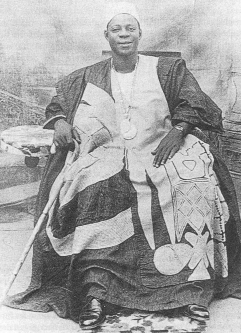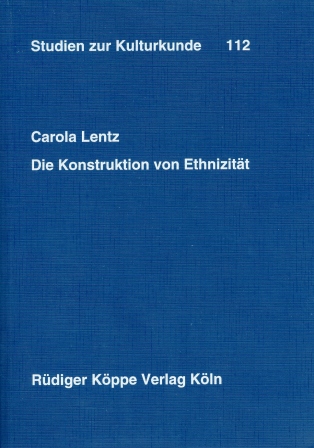

Die Konstruktion von Ethnizität
Eine politische Geschichte Nord-West-Ghanas, 1870–1990
Author: Carola Lentz. Series edited by: Beatrix Heintze, Karl-Heinz Kohl.
Series: SzK Studien zur Kulturkunde Volume 112
1998690 pp.
28 b/w photos, 19 maps, index of persons and places, subject index
Text language(s): German
E-book
€ 69.80
Buy 'Die Konstruktion von Ethnizität' as a downloadable PDF document directly from our online shop »
From the Contents (all texts are in German, titles are translated into English for better understanding): Local concepts of social belonging and territoriality – “Inhospitable, barbarous tribes”: The Northwest between Zabarima incursions and British rule (1870-98) – “Civilising a thoroughly wild and uneducated race”: The colonial pacification of the Northwest (1898-1906) – “Lobis”, “Dagartis”, and “Lobi-Dagartis”: The construction of ethnic boundaries – “A praiseworthy desire to better their fortunes”: The beginnings and development of labour migration – Of “totem clans”, “priest-kings” and “invasions”: Colonial debates on history and culture – “Light over the Volta”: The mission of the White Fathers – “Looking for a ‘tribe’ called the ‘Lobi’”: New discourses on ethnicity – The post-war reforms of local government – “The time when politics came”: The beginnings of party politics (1954-56) – The struggle for political hegemony: Party politics, chieftaincy conflicts and district boundaries (1956-62) – Lobby politics and ethnic movement: The organizational landscape of the 1970s and 1980s.
Review by Mamadou Diawara in den Cahiers d’Études africaines vol. 42, 165 (2002)
Accompanying material:
- Hexenjagd und Aufklärung in Ghana
(ISBN 978-3-89645-909-1 ) - Verwandtschaft und Mittelklasse in Ghana
(ISBN 978-3-89645-844-5 ) - Voices of Affliction
(ISBN 978-3-89645-245-0 )
Cross-reference:
- A Linguistic Study of Ewe Animal Names among the Ewe of Ghana
(ISBN 978-3-89645-474-4 ) - Kurzgrammatik des Ewe
(ISBN 978-3-927620-19-3 ) - Topics in West African Discourse-Pragmatics
(ISBN 978-3-89645-856-8 )
Reviews
Central to this most remarkable book is the question of how ethnicity is constructed through historical processes and by different actors in the Upper West Region of northwestern Ghana. Taking a closer look at this question provides the thread to a fascinating, multivocal and extremely well investigated microanalysis. Chronologically, starting with the time shortly before the colonial conquest of the northern part of today's Ghana, Lentz compares and interprets archival sources, seminal ethnographic accounts and her own extensive research material, and thus presents a detailed and exciting study of the area's political development from 1870 to 1990. [...] But coming back to the present book, Lentz in my opinion succeeds in situating all these issues in a complex net of relations, tensions and historical developments, making this a unique monograph that clarifies why, when, how and by whom Dagara 'ethnicity' is constructed. Lentz weaves in citations from interviews and archival files, statutes and articles of associations, speeches and biographies, and at the same time never forgets to equip the reader with detailed comments enabling him or her to follow her thoughts. I very much hope that this book will soon be available in English translation, making it accessible to a wider range of readers.
Andrea Behrends in Social Anthropology, 8/1/2000, 87-88
In her book about the political history of the Dagara in Ghana’s Upper West Region, Carola Lentz studies these processes. She does so in a theoretically well-founded way, and at a historical and analytical depth that is breathtaking. [...] Lentz’ book is an extraordinary well-researched and rich study. Without devoting extensive space to reviews of existing literature, the book has a clear theoretical framework, that organizes the presentation of the massive empirical evidence. The publication of an English translation would allow it to make the impact it deserves.
Axel Harneit-Sievers in Journal of African History, 40/3/1999, 494-496
Die Studie von Carola Lentz passt gut als 112. Band in die altehrwürdige ethnologische Reihe „Studien zur Kulturkunde“. Für ein kleines Fachpublikum gedacht, liegt die Priorität hier auf wissenschaftlicher Gediegenheit, sachkundiger Ausgewogenheit und erschöpfender Ausführlichkeit. Der Preis für den konsequenten Verzicht auf theoretische Höhenflüge, anthropologische Tiefgänge und mutige Abkürzungen ist freilich hoch. Insbesondere aber bekommt man die textstrategische Orientierung an dem Modell-Leser, der thematisch und regional bereits eingeweiht ist und als duldsamer Schreibtischarbeiter seiner Pflicht nachgeht, hart zu spüren. Das Buch hat mit 690 Seiten, 19 Karten, 28 Bildern und einem dreiseitigen Inhaltsverzeichnis eine monumentale Ausstrahlung, die die Aussicht auf ein anregendes Wochenende instinktiv in die bange Erwartung mehrerer arbeitsreicher Wochen verwandelt. Dies ist überraschend, weil Monographien ähnlicher Länge in der Regel entweder einem leserfreundlichen narrativen Stil verpflichtet oder thematisch so weit gefächert sind, dass sie sich wie Nachschlagewerke nutzen lassen – doch beides ist hier nicht der Fall. Der außergewöhnliche Umfang ist aber auch keiner umfassenden Systematik des Themas Ethnizität zu verdanken; vielmehr betont die Autorin, dass es eine allgemeine Theorie des Ethnizität gar nicht geben könne.
Der Titel des Buches „Die Konstruktion von Ethnizität“ hält also nicht ganz, was er verspricht. Dafür tut dies der Untertitel umso genauer: „Eine politische Geschichte Nord-West Ghanas zwischen 1870 und 1990“. Tatsächlich richtet sich das Buch in erster Linie an solche Leser, die sich für die Geschichte der Heterotopie moderner Staatsverwaltung in Afrika interessieren und selbst daran arbeiten. Für den Bereich Westafrika, speziell den Nord-Westen Ghanas und dort wiederum für die „Nandom Traditional Area“ hat Lentz einen Meilenstein gesetzt, an dem sich nachfolgende Forscher noch über Jahrzehnte abarbeiten werden. Zum einen hat sie mit bestechender Sorgfalt und unermesslichem Fleiß große Mengen neuer Quellen zusammengetragen und damit den Weg für weitere Detailstudien und Differenzierungen eröffnet. Zum anderen hat sie den Standard empirischer Dokumentation deutlich verschärft und damit die Messlatte für zukünftige Studien zur politischen Geschichte Afrikas erhöht. Schließlich hat die Autorin beispielhaft vorgeführt, wie man den oft beklagten Lokalismus und Synchronismus der Ethnographie überwindet.
[...] machte Barth auf das verblüffend einfache Argument aufmerksam, dass primordialistische Vorstellungen von Ethnizität einer historischen Überprüfung keinen Moment standhalten können. Wenn man bereit ist, die Passagen zu überlesen, weil sie im Vergleich zu dem ethnographischen Reichtum der Studie kaum ins Gewicht fallen, kann man die theoretische Zurückhaltung auch als metatheoretische Raffinesse auffassen. Allerdings muss sich der Leser auch diese Einsicht mühsam erarbeiten.
Richard Rottenburg in Historische Anthropologie, 10/1/2002, 155-156
| « back | Print version | [top] |
 Books
Books Audio
Audio Biographies
Biographies Series
Series Festschrifts
Festschrifts Journals
Journals